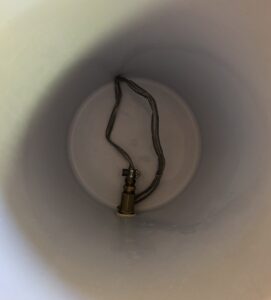Known as Saccharification. What??? What is saccharification. To the beginner brewer this is a strange and intimidating word. It can be a difficult process at times, but it can be quite simple as well.
Saccharification is the process of breaking a complex carbohydrate (such as starch or cellulose) into its simpler sugar components. Sounds easy now eh!

But it is such an important word. Even for the Canadian Food Inspection Agency. When I asked them if a distillery could use liquid malt extract instead of grain it through them for a stump. They eventually replied that the process had undergone the saccharification (mashing step) during the extraction process. So yes, a distillery could use liquid malt. But after much practice I found it just too expensive to be a viable commercial process unless you acquired the liquid malt in much cheaper than I was buying it for. But I have to admit, for a beginner, it was much easier to get a better tasting product than jumping into an all grain mash, and more flavourful than a sugar mash. It was less expensive because I didn’t have to buy a whole lot of equipment. And you can get a lot of different malts to copy all grain recipes. This goes for brewing and distilling.
I originally got the idea when A few friends and myself went and brewed at a local pub for a fund-raising project. They were brewing using liquid malt extract. That was a lot of fun. I jumped from brewing in a 5-gallon pail to brewing in a 900 Liter copper kettle and copper fermenter. It was quite the sight.
Getting back on topic of Saccharification, how do we do it. In its basic form we need a container to keep the mash at a constant temperature for a period of time.
There are a couple of ways we can do this:
- We can keep heat on the mash,
- or we can insolate the mash to keep at temperature.
Each of these ways have numerous methods we can talk about in many articles. To keep heat on the mash includes topics that includes systems called HERMS, RIMS and just using a plain pot. To insolate that mash to keep it at the right temperature you can convert an ice cooler into a mash tun to keep your mash warm.
Once we move from Extract Brewing to All-Grain Brewing, we have to talk about Diastatic Power. Another new and intimidating word we need to learn. Diastatic Power is how much starch converting enzymes any malt contains. It is measured in degrees Lintner. Different grains have different Diastatic Powers, such as 2 row barley has 110 Diastatic Power in Degrees Lintner and 6 row barley has 150 Diastatic Power in Degrees Lintner. There are many sites online that have Diastatic Power calculators by entering how much grain you are using of each kind. This is why you will see that most recipes for both brewing and distilling always contains either a two or six row barley,
If the grains we are using in our All-Grain brew do not have enough Diastatic Power, then it needs a little bit of help converting the starch to sugar. To do this we need an enzyme called Analyse. Amylase is a protein found in plants and animals that turns carbohydrates into sugars. In brewing plant Amylase is used to help convert the starch and carbohydrates in the grain into fermentable sugars.
When brewing all grain, a mush tun is a must. A mush tun helps hold the grain mash at a constant temperature of 65 to 68 C (149 – 154F) for around 90 minutes to allow the amylase enzymes convert the starches in the grain to sugar. Some recipes call for different amounts of time, but the Amylase converting the starts to take place at the 45-minute point. This where saccharification occurs. Remember, the process of breaking a complex carbohydrate (such as starch or cellulose) into its simpler sugar components.
To test if saccharification has been completed there are some equipment you can use. The easiest way to do this is to use iodine. Just put a little bit of wort in a white bowl and add a couple of drops of iodine in the wort. If it turns black, then the starch conversion to sugar is done.

Then acts as a large colander to strain the wort from the grain to rinse the sugars off the grain. Simple in a nutshell, but it is a little bit more to it than that. This process is called sparging.
Just like everything in home brewing, there is more than one way to do things and that includes the mash tun.

